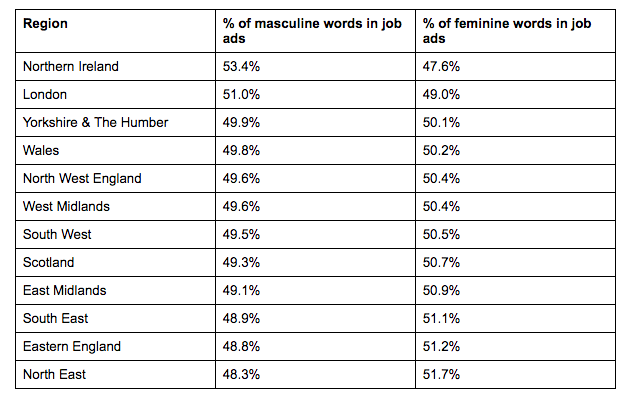A surprising number of job ads still use gender-biased language in the search for perfect candidates, according to research from job search engine Adzuna. London was the second worst offender, with 51 per cent of ads relying on ‘masculine’ language to describe their ideal job candidates, outdone only by Northern Ireland.
The research was conducted in March 2017, and analysed a selection of traditionally masculine and feminine words, as identified by a 2011 American Psychological Association study, across more than one million live job ads on Adzuna, observing the number of adverts in which each word appeared. The search covered 28 sectors and all 12 regions of the UK, to identify the industries most likely to appeal to applicants of each gender.
Northern Ireland and London saw the largest concentration of job adverts geared towards male candidates. Recruiters in the east of the country, on the other hand (including the North East, East and South Eastern regions) were more likely to appeal to female candidates, based on the language used in job ads in these areas.

The research found a high proportion of ‘male-dominated’ words in adverts for sales and consultancy positions, with words like ‘superior’ and ‘challenge’ appearing more often than the likes of ‘considerate’ and ‘understanding’.
Ads for roles in teaching, social work and nursing, on the other hand, were found to be worded in a way that may appeal more to female candidates, with an emphasis on ‘compassion’, ‘warmth’ and soft skills.
The technology industry was one of the least sexist when seeking new applicants, which, considering its male dominance, may suggest a conscious effort to eliminate bias in recruiting.
Even for the sectors that appeal equally to both men and women, the research highlighted a growing gender divide as the roles became more senior and the salaries rise. In the tech industry, senior data scientists and data architect roles both proved exceptions to the neutral language used elsewhere in the sector.
“While the tech industry once again seems to be making great strides and disrupting traditional recruitment methods, some exceptions still exist. In the emerging world of data science. Our research showed both data scientist and data architect roles remain more appealing for the male of the species,” says Doug Monro, co-founder of Adzuna. ”Unconscious bias may lead to accidental discrimination, but there is no excuse in 2017. It’s time for employers to head back to the drawing board and redesign their recruitment basics in order to keep up with the times!”
Recent data from the ONS showed a 19 per cent pay gap persists between male employees and their female counterparts. Despite improvements, it is predicted this gap will not close for at least another 70 years, Munro adds. “We need to do better.”






